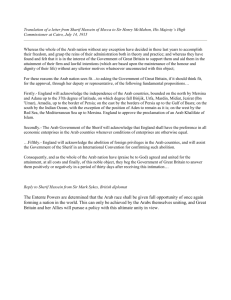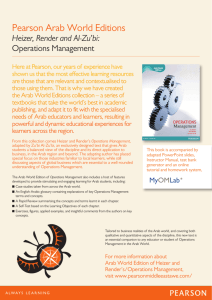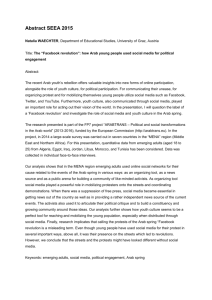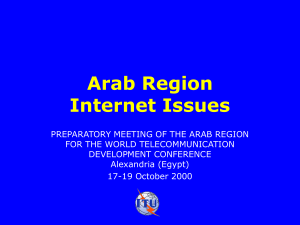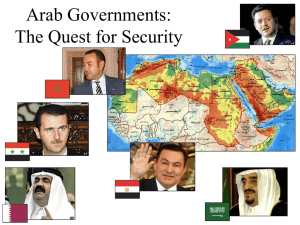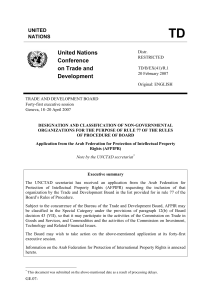Regional Report Key Messages and Recommendations
advertisement
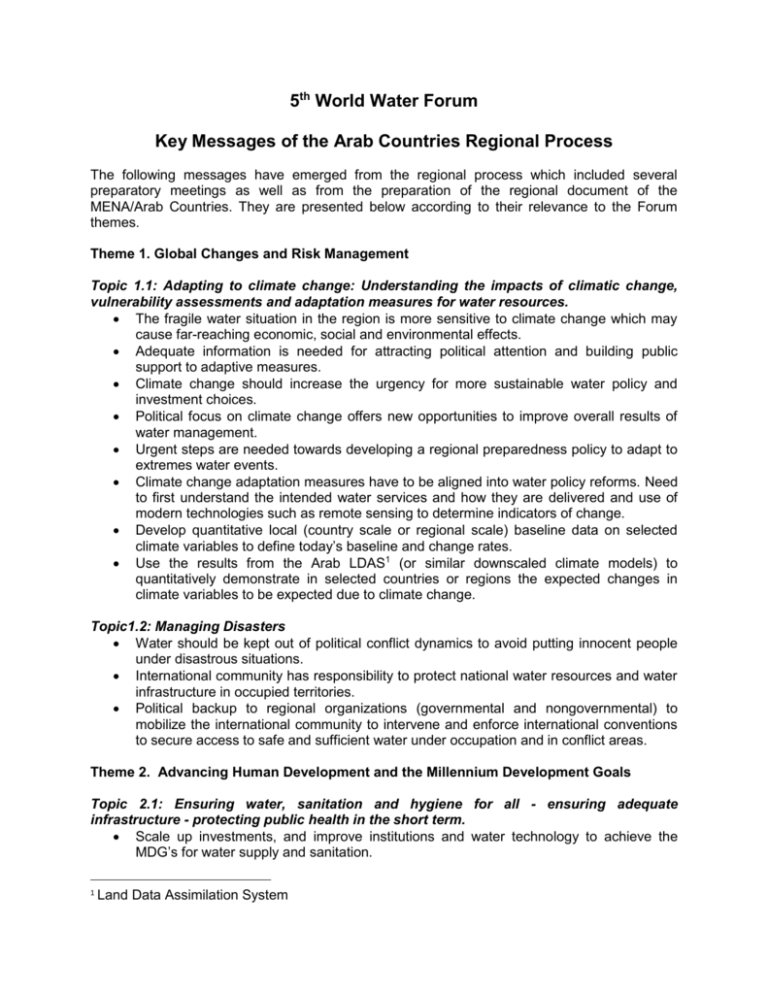
5th World Water Forum Key Messages of the Arab Countries Regional Process The following messages have emerged from the regional process which included several preparatory meetings as well as from the preparation of the regional document of the MENA/Arab Countries. They are presented below according to their relevance to the Forum themes. Theme 1. Global Changes and Risk Management Topic 1.1: Adapting to climate change: Understanding the impacts of climatic change, vulnerability assessments and adaptation measures for water resources. The fragile water situation in the region is more sensitive to climate change which may cause far-reaching economic, social and environmental effects. Adequate information is needed for attracting political attention and building public support to adaptive measures. Climate change should increase the urgency for more sustainable water policy and investment choices. Political focus on climate change offers new opportunities to improve overall results of water management. Urgent steps are needed towards developing a regional preparedness policy to adapt to extremes water events. Climate change adaptation measures have to be aligned into water policy reforms. Need to first understand the intended water services and how they are delivered and use of modern technologies such as remote sensing to determine indicators of change. Develop quantitative local (country scale or regional scale) baseline data on selected climate variables to define today’s baseline and change rates. Use the results from the Arab LDAS1 (or similar downscaled climate models) to quantitatively demonstrate in selected countries or regions the expected changes in climate variables to be expected due to climate change. Topic1.2: Managing Disasters Water should be kept out of political conflict dynamics to avoid putting innocent people under disastrous situations. International community has responsibility to protect national water resources and water infrastructure in occupied territories. Political backup to regional organizations (governmental and nongovernmental) to mobilize the international community to intervene and enforce international conventions to secure access to safe and sufficient water under occupation and in conflict areas. Theme 2. Advancing Human Development and the Millennium Development Goals Topic 2.1: Ensuring water, sanitation and hygiene for all - ensuring adequate infrastructure - protecting public health in the short term. Scale up investments, and improve institutions and water technology to achieve the MDG’s for water supply and sanitation. 1 Land Data Assimilation System Move to stronger partnership with the civil society and put greater emphasis on sustained economic growth and social equity. Encourage national and subregional monitoring and evaluation (M&E) programs for enhancing the achievement of the water MDGs. Expand social integration over the region, where wealthy countries and development banks contribute to an Arab Water MDG Fund that can finance achieving the Water MDGs in the less-fortunate Arab countries. Topic 2.2: Water for food for ending poverty and hunger Since available water resources will never be sufficient for food self-sufficiency, virtual water represented by imported food will remain a factor to close the gap between supply and demand. Increase of imported food prices reemphasized the role of irrigation in food security. Various economic policy instruments and improved cropping and irrigation practices are needed to reduce water consumption in irrigation. Nonconventional water resources will have a growing role in closing the water- supplydemand gap. Theme 3. Managing and Protecting Water Resources and Their Supply Systems to Meet Human and Environmental Needs Topic 3.1: IWRM basin management and transboundary cooperation A properly conceived framework of cooperation leads to a “win-win” situation in managing shared water resources. Crafting sustainable agreements, using customary international law offers “no harm” solutions. Joint work between water scientists, institutions and practitioners in riparian countries creates a common knowledge base and opens opportunities for cooperation. National IWRM plans need to be set, implemented and monitored country-wise and across the region. Water demand management should be encouraged at practice and policy levels. Enforcing and updating policies and laws related to pollution control, water resources protection and conservation of ecosystems as national strategic targets to be implemented at the local level. Desalination and wastewater reuse provide the options for meeting future water demands, principally for domestic consumption. Theme 4. Governance and Management Topic 4.1 Right to Water Address power relations and interests as part of the determinant of the water policy cycle. Improve water governance as a priority to improve water management and to address the scarcity challenge. Topic 4.2 Institutional Arrangement Promote decentralization of water management in urban and agricultural water management. Sustain the political support to reforms in the water sector and cease the opportunities of global challenges (food, climatic change, etc.) to take hard policy decisions. Encourage involvement of all stakeholders in water planning and decision making. Institutionalize anticorruption and transparency mechanisms through effective and efficient institutions Support the independence of regulatory bodies and create mutual accountability between stakeholders in the water sector. Theme 5. Finance Topic 5.1: Sustainable financing for the water sector Encourage all forms of economic incentives to promote efficient use of water in urban and rural agriculture without compromising social equity. Cost recovery is necessary for water use efficiency and financial sustainability without compromising the principle of water as a “public good.” Improve the enabling environment to scale up private-sector participation in water investments and management. Charging for water services should not impact the least-able to pay and vulnerable groups most. Engage International and regional financing agencies and the Arab Funds to finance water-sector development and reform. Theme 6. Education, Knowledge and Capacity-Building 6.1: Education, Knowledge and Capacity-Development Strategies Recognize the balance between knowledge, capacity development and infrastructure to achieve the most appropriate water-governance strategy. Set strategic plans to respond to human resources and financial needs of institutions in the water sector. Encourage and support the (Arab Water Academy) AWA as an innovative regional capacity-development facility which creatively combines Water Sciences, Water Business Management and Water Governance Thinking. Encourage networking between research centers and universities in the Arab region and between the region and international centers of excellence to enhance knowledge and capacity-building.


